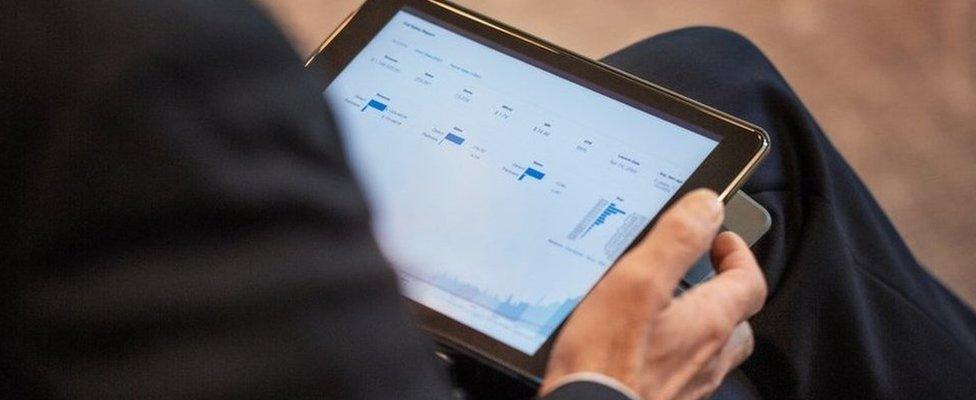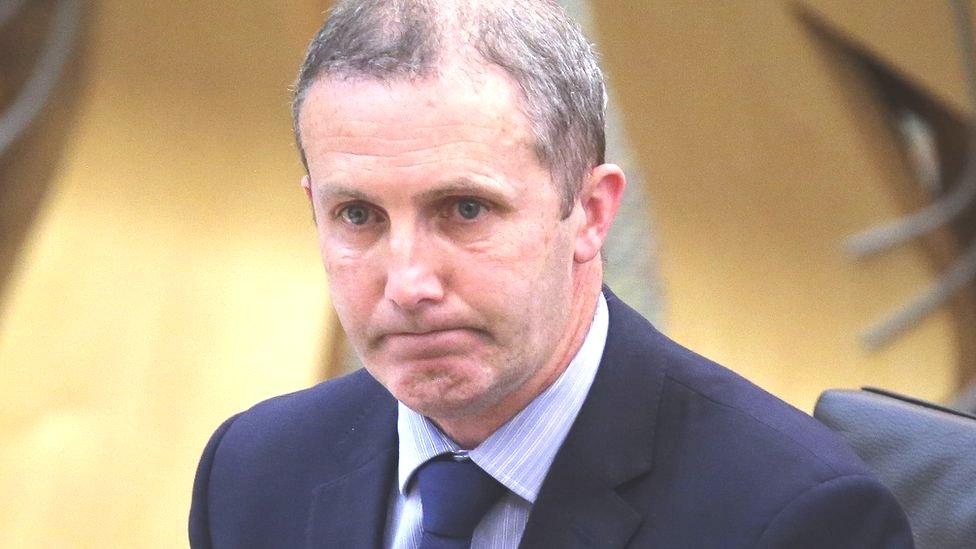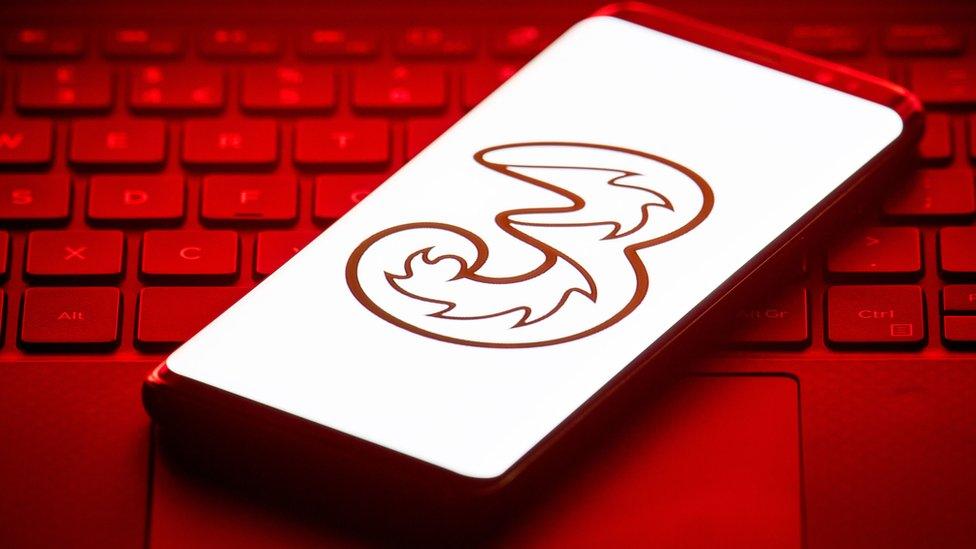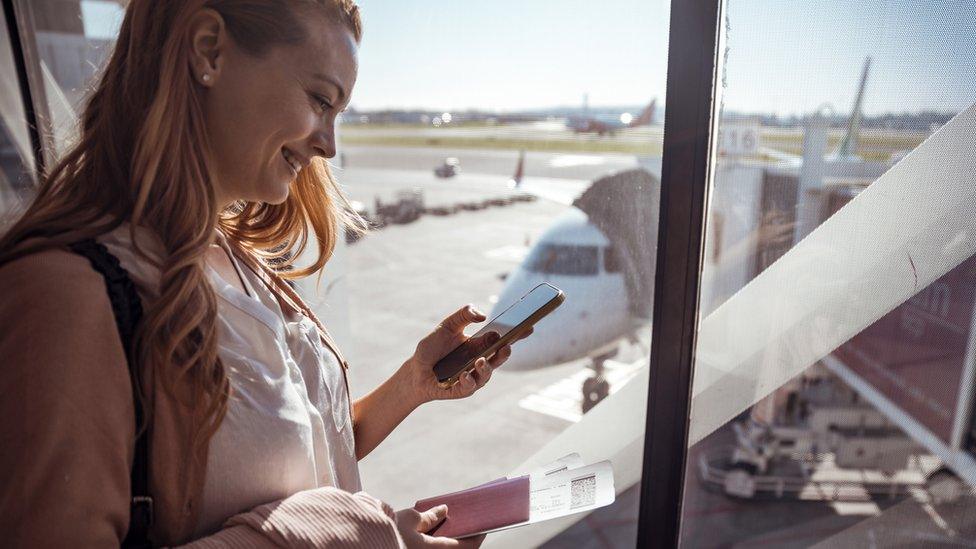Minister's £11,000 iPad bill is legitimate expense - Humza Yousaf
- Published
Mr Matheson blamed an outdated SIM card for the £11,000 roaming charges on his iPad
An £11,000 iPad roaming bill racked up by Scotland's health secretary was a "legitimate parliamentary expense", according to the first minister.
Michael Matheson ran up the charges on his parliamentary iPad during a holiday to Morocco which he says was caused by an "outdated sim card".
He said he was not aware it was due to be replaced and the cost built up as a result.
Humza Yousaf said Mr Matheson should not have to pay it back.
It is understood the health secretary had been using the iPad during a family holiday for constituency work when the charges occurred.
Speaking in the Scottish Parliament after First Minister's Questions, Mr Matheson said: "It has been caused by an outdated sim card that was in an iPad that I had for constituency purposes, which was a parliamentary iPad."
Roaming charges are an expense incurred when using mobile devices abroad.
It is understood Mr Matheson was using an old sim card from the parliament's previous provider EE. Its current contract is with Vodafone.
Before each recess, Holyrood contacts MSPs to remind them they could incur "expensive out of tariff charges" if travelling outside Europe without a roaming bundle from IT.
The health secretary said he was unaware the sim card needed to be replaced.
Mr Matheson added: "As the parliament has also stated very clearly, the network provider didn't provide information around the costs that were being incurred as well.
"So it was something that was unknown to me, and as the parliament have also confirmed, the parliamentary equipment was used for constituency and parliamentary purposes."


Michael Matheson came back from Morocco with a very unwelcome souvenir - a hefty data roaming bill.
He spoke - very briefly - with journalists in Holyrood this afternoon, insisting this was all down to an old sim card that he was not aware had to be replaced
The health secretary was swift to depart, refusing to take any of the many questions journalists wanted to put to him.
We don't have the complete picture of what Michael Matheson used his iPad for in Morocco.
Why didn't he ensure it was on Wi-Fi? How did the bill get so high? And is it right that the taxpayer picks up the bill?
Humza Yousaf defended his health secretary this afternoon, saying he shouldn't have to pay back the money.
But it feels like the next time Mr Matheson is in front of the microphones, he'll still be facing questions over this Morocco trip.

Mr Matheson, who as the cabinet secretary for health and social care receives receives a yearly salary of £118,511, external, has agreed to pay £3,000 towards the bill from his expenses budget, external.
Mr Matheson did not respond when questioned on whether he should make a contribution to the bill out of his own pocket.
He also did not respond when asked why taxpayers should foot the bill.
The £11,000 bill is more than the total of all MSPs' mobile phone, business line, tablet and staff phone bill expenses claimed in 2022/23 combined. The total for all phone-related expenses last year was £9,507, external.
Craig Hoy, chairman of the Scottish Conservatives has called on Mr Matheson to cover the costs himself.
He said: "Michael Matheson offered only a cursory explanation - and no apology - for racking up this enormous bill. His sense of entitlement is breathtaking.
"The first minister is wrong to say this was a legitimate expense.
"Michael Matheson must belatedly do the right thing and pay back this £11,000 in full - no ifs, no buts."
A Scottish Parliament spokesman said that, following an investigation, senior officials "accepted Mr Matheson's assurances that all costs incurred were for parliamentary purposes".
They added: "Following the close of the financial year, it was agreed by parliament's senior management, in September 2023, that the events of this incident should lead to a policy review of mobile data usage.
"In addition to reviewing the policy, the parliament will shortly award a new mobile contract that will enhance technical controls to ensure there is no repeat of these substantial data charges."

How do data roaming charges work?

Roaming charges are the higher prices that mobile networks charge for your device use when abroad.
It has always been more expensive the moment you leave Europe, with some providers charging £7 a megabyte for data and nearly £4 a minute to make or receive a phone call, according to personal finance site MoneySavingExpert, external.
The costs for using your device overseas can vary wildly depending on the contract.
Some companies offer daily charges. For instance, you can pay £5 a day for worldwide use and you will be able to use your phone or tablet just as you do at home.
The advice from personal finance writers is always the same: If in doubt, play it safe and turn roaming off.
Related topics
- Published9 November 2023

- Published9 September 2021

- Published20 July 2023
